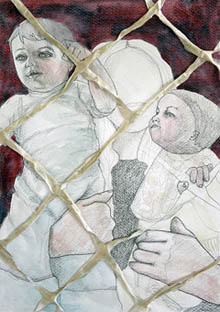
Professors and researchers of the Department of Spanish of the University of Valencia have published the third issued of ‘Kamchatka. Magazine of cultural analysis’, coordinated by Jaume Peris, Jesús Peris and Nuria Girona. In its latest edition, the magazine presents a monographic block on ‘Cultural representations of the child stealing under the Franco regime and the dictatorship of Argentine’, coordinated by Luz C. Souto.
The monograph also aims to reflect on the difference between the position of the generations who lived through the events and the generations that did not live them, but who think of being heirs of a lack that hinders the construction of identities and that has made exploit the concept of family. It also reflects on what is the social response against the social confusion generated by the disappearances of children and the lack of information. Thus, the issue is proposed as an approach of the academic world to the different sectors of society, promoting the exchange with artists and the collaboration with Human Rights organisations.
The block of academic articles of the monograph has contributions of Spanish, Argentinian, Italian and North-American researchers. We present three works devoted to the child stealing in the dictatorships of Franco and three to the child srtealing in the dictatorship of Argentine.
The monograph is complemented by an interview to the Argentinian writer Martín Kohan and three plays on the theme: a Spanish play, ‘La sonrisa del Caudillo’ (The Smile of the Warlord), by Rubén Buren; an Argentinian, ‘Instrucciones para un coleccionista de mariposas’ (Instructions for a Collector of Butterflies), by Mariana Eva Pérez; and the text of a Spanish playwright who dramatizes the history of Argentina, ‘Si un día me olvidaras’ (If One Day You Forgot Me), by Raúl Hernández Garrido.
The proposal is chaired by the Argentine painting by artist Maria Giuffra, ‘El niño ni muerto ni vivo, el niño desparecido’ (The child neither dead nor alive, the missing child), a picture that condenses the themes tackled from the stealing: mothers in permanent disappearance, elicited identities, children of old sight, hands that desperately cling because they will stop doing it soon. And the bars imposed on the image, which extend in time and although at times they are less visible they remain equally effective. The separation is not explicit, it is hinted, it encourages us to think about what follows the absence, in what is still operating today behind the disappearance of children, about what constitutes us, painfully, as an uprooted society.
The issue is available on these links:
http://ojs.uv.es/index.php/kamchatka
http://revistakamchatka.wordpress.com/
Last update: 24 de june de 2014 11:54.
News release


















